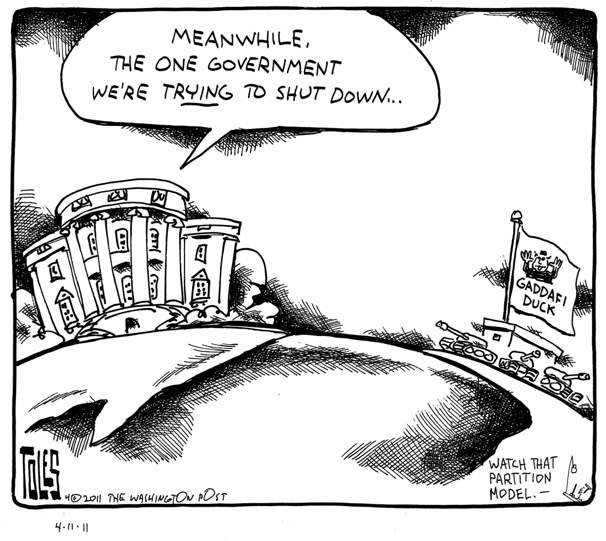According to O Globo, Brazil’s Civil Aviation Secretary, Walter Bittencourt, guarantees that his people are working so that the nation’s airports can handle the influx of people attending the World Cup in 2014.
We’re discussing the exact strategies we can use to accelerate the work on the airports . . .
Of course, promising that you’re working hard is different than promising that the airports will be ready. I’m hoping they will be.
Nine of the 12 airport projects underway in Brazil won’t be ready until the World Cup in 2014. In other words, they won’t be ready until after the last goal has been scored and the last fan has flown out of the yet-unfinished airports.
The movie “Fast and Furious 5 Paints a Corrupt Image of Rio.”
Or as Pogo might say,

Today in The Washington Post,
Robert Samuelson writes,
We in America have [elected a] suicidal [president]; the threatened federal shutdown and stubborn budget deficits are but symptoms. By suicidal, I mean that [president] has promised more than [he] can realistically deliver and, as a result, repeatedly disappoints by providing less than people expect or jeopardizing what they already have.
Okay, so I changed a few things, the word president for the word government, for example. Or the word elected for the word created. But Samuelson could have written what I’ve posted and still have been right. Right?
Anyway, he actually says that our suicidal government is so in part because
[We] depend on it for so much that any effort to change the status arouses a firestorm of opposition that virtually ensures defeat.
Why is that? Surprise of surprises, because
The Census Bureau reports that in 2009 almost half (46.2 percent) of the 300 million Americans received at least one federal benefit: 46.5 million, Social Security; 42.6 million, Medicare; 42.4 million, Medicaid; 36.1 million, food stamps; 3.2 million, veterans’ benefits; 12.4 million, housing subsidies. The census list doesn’t include tax breaks. Counting those, perhaps three-quarters or more of Americans receive some sizable government benefit. For example, about 22 percent of taxpayers benefit from the home mortgage interest deduction and 43 percent from the preferential treatment of employer-provided health insurance, says the nonpartisan Tax Policy Center.
Kind of makes you lose hope that things are going to change.
 budget, Economics, Government, Health Care, Politics, Spending Cuts, Taxes
|
budget, Economics, Government, Health Care, Politics, Spending Cuts, Taxes
|  depends, Pogo, Robert Samuelson, The Washington Post, Walt Kelly
depends, Pogo, Robert Samuelson, The Washington Post, Walt Kelly
Over at The Washington Post, Ted Toles nails it.

This past Thursday, a young gunman entered a school in Realengo, a neighborhood in Rio, and killed 12 young students. The story has dominated the pages of Brazil’s newspapers and the coverage of its television stations.
And it led to protests in favor of disarming the Brazilian people.

My sympathies go out to those who lost loved ones and to those injured in the gunman’s mindless rampage. That said, this bumper sticker never spoke more sense, even in Brazil:

Gary Becker, George Schultz, and John Taylor have a plan to bust the budget. It’s worth reading. To me the most obvious gem in the plan, and the one most sorely missing in all the talk in Washington right now is this:
Assurance that the current tax system will remain in place—pending genuine reform in corporate and personal income taxes—will be an immediate stimulus.
Congress and the President (any Congress and any President) have used the tax code to implement policy choices. It’s time to leave the rules be, so that business can plan, something they are loathe to do when there’s no promise that the rules won’t change next week.
 budget, Economics, Government, Inflation, Law, Liberty, Politics, Spending Cuts, Taxes, Unemployment
|
budget, Economics, Government, Inflation, Law, Liberty, Politics, Spending Cuts, Taxes, Unemployment
|  Gary Becker, George Schultz, John Taylor
Gary Becker, George Schultz, John Taylor





